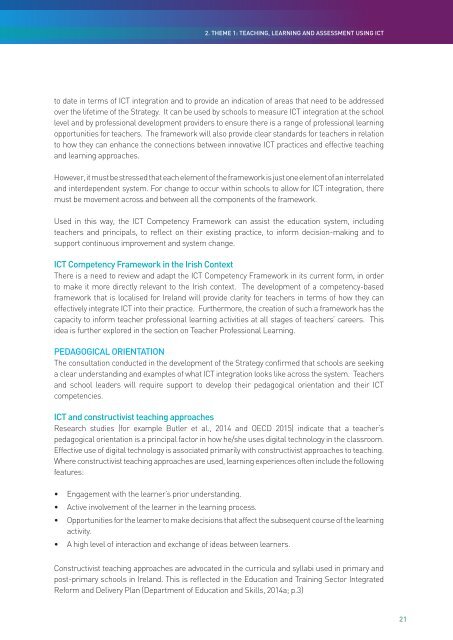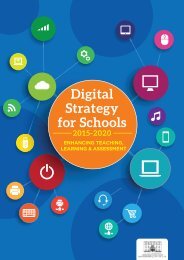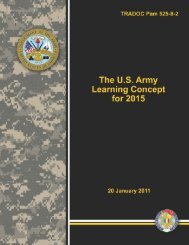Digital Strategy for Schools
TKmef
TKmef
You also want an ePaper? Increase the reach of your titles
YUMPU automatically turns print PDFs into web optimized ePapers that Google loves.
2. THEME 1: TEACHING, LEARNING AND ASSESSMENT USING ICT<br />
to date in terms of ICT integration and to provide an indication of areas that need to be addressed<br />
over the lifetime of the <strong>Strategy</strong>. It can be used by schools to measure ICT integration at the school<br />
level and by professional development providers to ensure there is a range of professional learning<br />
opportunities <strong>for</strong> teachers. The framework will also provide clear standards <strong>for</strong> teachers in relation<br />
to how they can enhance the connections between innovative ICT practices and effective teaching<br />
and learning approaches.<br />
However, it must be stressed that each element of the framework is just one element of an interrelated<br />
and interdependent system. For change to occur within schools to allow <strong>for</strong> ICT integration, there<br />
must be movement across and between all the components of the framework.<br />
Used in this way, the ICT Competency Framework can assist the education system, including<br />
teachers and principals, to reflect on their existing practice, to in<strong>for</strong>m decision-making and to<br />
support continuous improvement and system change.<br />
ICT Competency Framework in the Irish Context<br />
There is a need to review and adapt the ICT Competency Framework in its current <strong>for</strong>m, in order<br />
to make it more directly relevant to the Irish context. The development of a competency-based<br />
framework that is localised <strong>for</strong> Ireland will provide clarity <strong>for</strong> teachers in terms of how they can<br />
effectively integrate ICT into their practice. Furthermore, the creation of such a framework has the<br />
capacity to in<strong>for</strong>m teacher professional learning activities at all stages of teachers’ careers. This<br />
idea is further explored in the section on Teacher Professional Learning.<br />
PEDAGOGICAL ORIENTATION<br />
The consultation conducted in the development of the <strong>Strategy</strong> confirmed that schools are seeking<br />
a clear understanding and examples of what ICT integration looks like across the system. Teachers<br />
and school leaders will require support to develop their pedagogical orientation and their ICT<br />
competencies.<br />
ICT and constructivist teaching approaches<br />
Research studies (<strong>for</strong> example Butler et al., 2014 and OECD 2015) indicate that a teacher’s<br />
pedagogical orientation is a principal factor in how he/she uses digital technology in the classroom.<br />
Effective use of digital technology is associated primarily with constructivist approaches to teaching.<br />
Where constructivist teaching approaches are used, learning experiences often include the following<br />
features:<br />
• Engagement with the learner’s prior understanding.<br />
• Active involvement of the learner in the learning process.<br />
• Opportunities <strong>for</strong> the learner to make decisions that affect the subsequent course of the learning<br />
activity.<br />
• A high level of interaction and exchange of ideas between learners.<br />
Constructivist teaching approaches are advocated in the curricula and syllabi used in primary and<br />
post-primary schools in Ireland. This is reflected in the Education and Training Sector Integrated<br />
Re<strong>for</strong>m and Delivery Plan (Department of Education and Skills, 2014a; p.3)<br />
21




